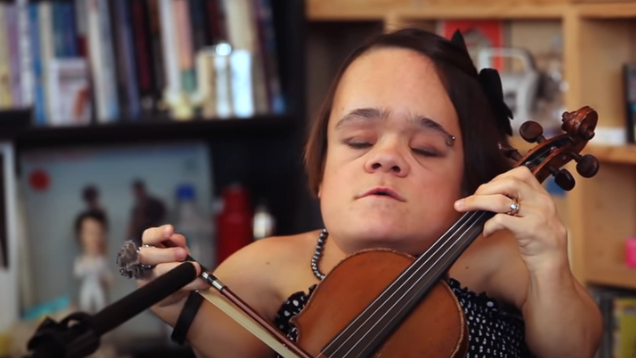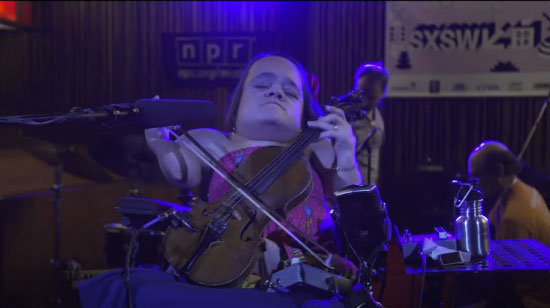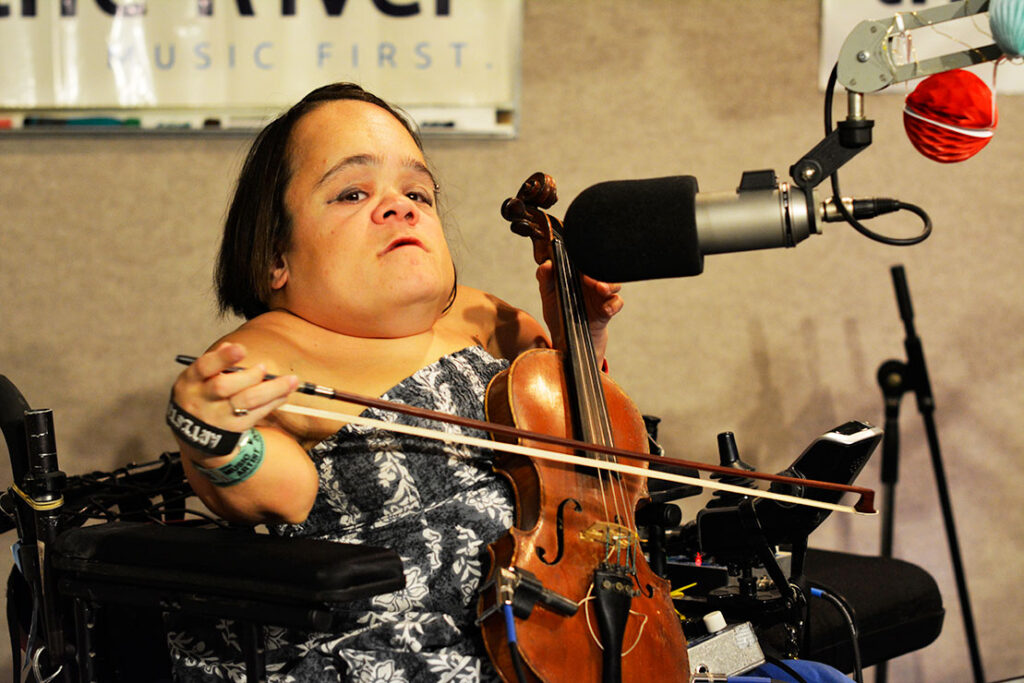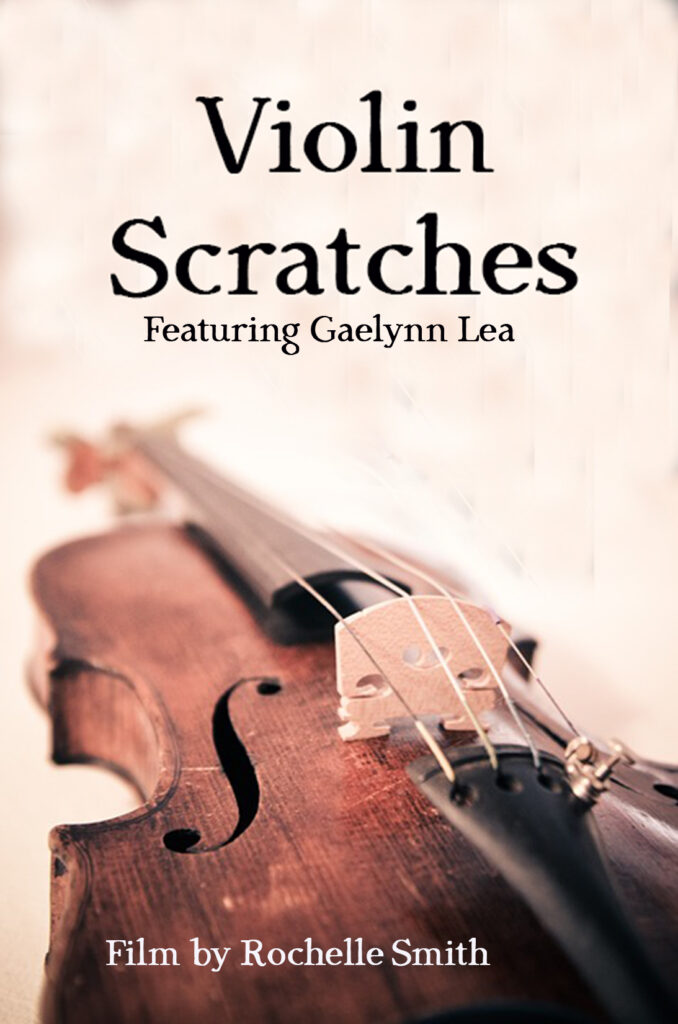Violin Scratches is a documentary about a woman with brittle bone disease who proves to the world that she is valuable, influential, inspirational, and simply not a quitter. From it we learn about courage and how not to let our limitations dictate who we can become. We can all learn from Gaelynn Lea. I am not the only person moved by this compelling story.
This has been a big year for Violin Scratches, a short directed by Rochelle Smith. The film just won Best Short Documentary Pro-Action at the Artemis Women In Action Film Festival. In February 2021, Violin Scratches won the Oregon Short Film Festival, and is currently appearing in other festivals across the country, all the while . . . raising our consciousness!
ABOUT: Gaelynn Lea is a performer and activist. She doesn’t let a disability get in the way of playing violin, writing a book, and doing TED Talks. Get a glimpse into her life as she shares a traditional instrumental from Finland. Gaelynn Lea, performer; Rochelle Smith, interviewer and director. USA
Questions by Kaylene Peoples | Responses by Rochelle Smith
Tell me a little about your documentary and what inspired you to make Violin Scratches?
We have a yearly music event called, Treefort Music Festival. During that week, our radio station is busy with several band interviews and performances. Hundreds of people perform, so I try in advance to find interesting people to come in for sessions. Performer Gaelynn Lea caught my eye. In doing research, I watched her NPR Tiny Desk performance, and TED talks she has online. I knew right away that I had to speak with her.

How long did it take to complete it? What was it shot on?
The interview and performances actually took just under and hour. She did two songs with vocals, then an instrumental. It was shot on a basic digital camera while I was interviewing. During editing and remixing the songs the next few days, some things she said really stood out. At one point I imagined what it might be like to take the best excerpts and put them over the instrumental song she did.
What was it like to shoot this documentary?
This was really different from my other documentaries, as it wasn’t a planned film. As Gaelynn was speaking, I could feel that something special was happening. She was connecting in a very real and intimate way. I started listening to her words and assembling them over the music in a certain way. The editing took quite some time to get it to feel right, and I loved her expression after the last note, where her eyes are closed and her violin just dangles from her hand.
Who else was involved in the making of the documentary?
This was something else unusual about filming. For the first time ever I asked my bosses if I could bring Gaelynn in after hours. Our building has 4 different radio stations of different formats, filled with daily chaos, morning show pranksters, and salespeople. I didn’t want any hassle or obstacles, comments or glances about what we were going to do. I got an after-hours elevator code. When the building was mostly empty, Gaelynn, her husband, and her guitarist went into our studio.
What was your experience on Violin Scratches?
I became pretty obsessed while editing some of her best words down to a few minutes, and leaving some space in a really important part of the film. Something just told me to do this. I saw her performance the next day at Treefort, and it was packed. People loved her.
What were some of the most memorable moments, while working on this film?
That day, I was a bit stressed out and grouchy with so much going on. Gaelynn Lea was born with Brittle Bone Disease. I watched her toes peak out to change her loop pedal from her wheelchair. She was telling me how friends and positive thinking opened her life up to playing violin, and finding a husband. After seeing what this woman has to deal with regarding access, and playing a complicated instrument, it completely shifted my perspective.

As a documentary filmmaker, tell me about your background.
For work, I’m a radio announcer and audio engineer. Much of my background is in music, and I also love to write. I’ve covered many rallies and protest on our Statehouse steps, but I also love people’s stories. I started a podcast called, “She Likes To Go Slow,” many interviews are recorded in my VW camper van. I prefer when I can share video with the stories. I’m doing a few fiction short film stories right now, but really missing the documentary style. Documentaries compel me to cover people’s stories, struggles, thoughts, and achievements. I love interviewing strangers, and sometimes getting them to share their secrets.
It didn’t start out as a movie. It became one.
Were there any challenging moments?
It’s always a challenge during interview, to try to be a bit different. I picture what these performers must be asked every single time, and try to find at least one question that pulls them from the predictable interview path. Gaelynn got real with me right away, and I love it when that happens. It kept things from being challenging.
What were some of the highlights?
Gaeylynn’s passion and drive really surprised me. Her knowledge and intellect covered so much more than music. She was working on a disability survey, talked about the peer pressure of beauty products, and how someone’s death changed her way of thinking.

What were some of the obstacles?
There really weren’t any obstacles, I do wish I’d had several cameras and maybe a helper. Somehow though, I wonder if things wouldn’t have turned out the same.
On your next project what might you do differently and what might you do the same?
My next project is actually and LGBTQ+ comedy, with a cast and crew of about 15 people and lots of props and lights. It’s called Pink Feather. I use people who aren’t actors and let them wander from the script. Another short I’m doing features a pioneer female inmate from the Old Idaho Penitentiary. After that, I’m doing a documentary for a friend, and then hopefully one for myself! When done right, a simple documentary can be so powerful.
How has Covid19 affected your production/post if at all?
Only as far as film festivals. It’s been sad to see so many go virtual, but I wonder if it helps get more exposure to films.
What advice could you give to a first-time documentary filmmaker?
Get past whatever obstacle is keeping you from doing it. If you don’t have fancy equipment, use what you have. If you don’t have experience, volunteer on other local films. Even as an extra, you can learn much about how things work. Also, back up everything religiously.
Is there is anything else you’d like to mention. If so, please do
Please learn more about, and support Gaelynn Lea. Her website is www.violinscratches.com. She is writing a book, has a Patreon, and does Sunday Sessions on Facebook every week.
Violin Scratches is currently screening at the Artemis Women in Action Film Festival (AWIAFF) through the month of May 2021. Get your all-access pass at artemisfilmfestival.com and watch this incredible documentary.





